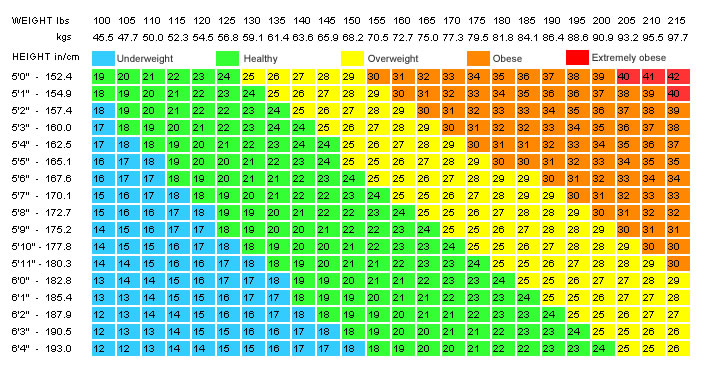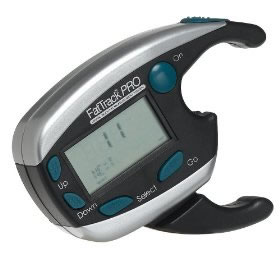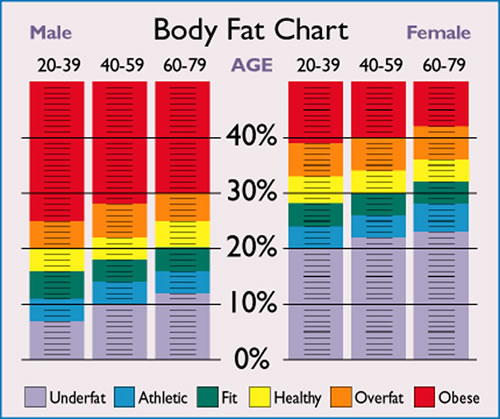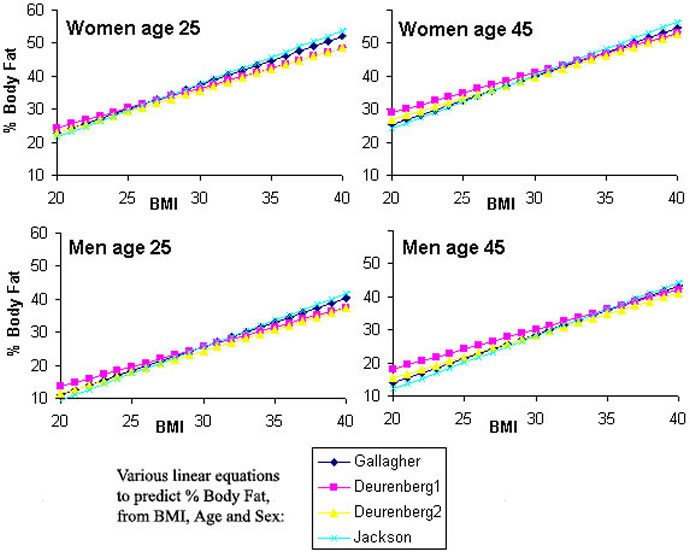Fitness & Health - Diet, Body Composition and Training Tips
Food intake (carbs, protein, and fat), BMI, % body fat, and VO2max
Counting calories in & calories out
I have found that in business or in my personal life that if I can't measure something I will have a tough time making progress against my goals. Quantifying things seems like an engineering approach to life (yes, I am a product of my environment as an engineer by training), but I know it works, and I also know that a lot of other people fail in the achievement of their goals simply because they don't take a quantitative approach to problem solving and goal planning.
I have learned the simple art of counting both the amount of calories I ingest daily (I take notes on my smartphone each and every time I eat or drink something) and if I don't already know the approximate # of calories involved, I 'google' the item and always quickly find out the answer when I sit down at a computer.
The other trick is to know how many calories you are burning. Again, 'google' it and determine your break-even 'set point' - your average daily burn rate (for me at age 47 in 2008 with a desk oriented job I was burning about 2100 calories, not including workouts) and get to be able to estimate your workouts (walking actively is about 250 calories an hour, running at 6mph is about 600 calories an hour, aggressive/fast road biking burns 700+ calories an hour or more, etc - it really depends on your sex, age and weight). Here are some links to great online calorie calculators:
Running: www.peakinspiration.com/efcaloriesrun.htm
Road Biking: www.peakinspiration.com/efcalories.htm
The math is very straight forward - add up your calories in, subtract your workout calories, and then net it against your daily burn rate (e.g. in the 2000-2200 range - generally less as you age, and certainly less for women) and then add up all of those 'net' calories - for every 3500 'net' calories above or below your 'set point' you will gain or lose 1lbs of fat.
[Note: this is approximately true but there are some limits to the 'linearity' of this 'rule'. As you lose weight by eating fewer 'net' calories, your body will adapt and will eventually taper off and create a new lower body weight balance point - you won't disappear entirely! And depending on your initial body fat percentage, the speed of weight loss may also vary somewhat. Check out this advanced calculator to predict your weight loss, available at: bwsimulator.niddk.nih.gov]
Here's a table of my personal training/weight loss tracking over a 4-1/2 month period in 2008 where I lost 20lbs or 1lbs/week (anything over 1.5lbs/week of weight loss isn't very good for you):
My Calorie & Weight Tracking Table
And yes, it worked out very accurately in real life for me: as of January 12, 2009, I was actually 163lbs, down from 183-185lbs over the summer of 2008 (I weigh myself as soon as I get out of bed, post bathroom break, daily), had 13.5% body fat (down from 24%) and a BMI score of 23 (down from 25-26 - see below) - this puts my body mass into the 'athletic' range and rates as 'excellent' for my age (and makes me a happy guy).
By actually tracking my calories in/out I found out something sinister - I have to eat a lot less than my hunger/desire for food intake suggests to hit my 'set point' at age 47 (with my aging/slowing metabolism). For example, my 'old' daily meal looked something like this:
- Juice - 125 calories
- Cereal with milk - 400 calories
- Starbucks Latte - 300 calories
- Chicken Sandwich with Mayo - 550+ calories
- Cookie - 200+ calories
- Afternoon Snack - small handful of nuts - 125 calories
- Modest Dinner (no desert) - 750 calories
Total Calories for the day: 2450-2600 calories
This is less than I'd normally like to eat to feel 'full' as I'd usually want some type of snack with my Starbucks Latte as well as a desert after dinner, and the painful truth is, that without additional exercise, I'd gain 1/2lbs+ of fat a week on this meal plan without a lot of trips to the gym - which I'd often skip. When you look at my weight loss table above you will notice 2 things: (1) I was eating very little on average, and (2) I was working out like a madman - that is due to the long, strenuous bike rides I was doing during this period. The hard truth is that dieting to lose weight without burning off additional calories from working out is hard stuff - I can lose weight and not feel that hungry or tired much more effectively with as little as a 500-600 calorie workout 3-4 times a week.
Keep in mind that sugars in processed foods are a real problem and should be avoided. Cutting down on sugars and replacing those calories with quality fat calories is a really good way to get your weight down - there is increasing evidence that a calorie is not always a calorie - fructose does not trigger an 'I'm full' response when injested which is normally 50% of all sugar composition, but high fructose sugars are 2/3rd fructose so this is a really bad source of calories - when you eat foods with this crap in them you are turning those calories straight into fat it you are not working out a ton. You have been warned!
Balancing Carbs, Protein and Fat Intake
I am fairly sensitive to my blood sugar levels - if I eat too much sugary food I usually don't feel very well afterwards. When you eat simple sugars they are rapidly absorbed and cause your blood sugar levels to spike. Then your body compensates by pumping insulin into your blood - in short order you will start to 'crash' as your blood sugar levels start to head the other way.
I have learned to limit the amount of simple sugars in my diet - I try and eat 'complex' carbs that are slower to breakdown and digest and don't cause rapid swings in my blood sugar levels.
Another important point is to always balance the carbs, protein and fat with each and every meal you have - get some of each category of food type (carbs, protein and fat) as part of every meal you eat and your body will thank you for it. Protein and fat slow the uptake of sugars, stabilize and help regulate your digestive system, and feed your body and mind with the balanced nutrient loads that they need.
Different people have differing advice on what the right balance is but for me 40% calories from carbs, and 30% from each of protein and fat works best. High performance athletes tend to like to go for a 60/20/20 ratio rather than 40/30/30 (the 'zone' diet plan, see www.zonediet.com) because those folks want immediate access to energy and don't want their digestive systems to have to burn energy breaking down food into the energy sources that they need. For me (and I bike up to 200kms a week, and lift weights 3 times a week), the zone diet makes me feel better over-all.
Working the Math on Counting Calories
1 gram of carbs or protein provides 4 calories of energy, but 1 gram of fat provides 9 calories of energy - fat is the body's energy storage system.
When reading food nutrition labels watch out for the following things when interpreting what you are about to eat:
- The calories listed are for a given amount of the food - not always the total amount in the package, but a 'suggested serving size'. Check the total grams on the package and then figure out whether you need to multiply the calories listed for the 'suggested serving size' to come up with the total amount of calories you are eating
- When attempting to see what the balance of carbs, protein and fat are, the % of daily recommended intake should be ignored - the only things you should be looking at are the grams of carbs, and protein (multiply by 4 to find the total calories from those) and the grams of fat (multiply by 9). Then look at the ratios to see if you are getting near the 60/20/20 or 40/30/30 ratios.
- Fast food is almost always heavy in fat - to such a degree that you won't have a chance of staying 'in the zone' without resorting to some sort of modification to the meal itself.
Supplements
I take a few additional supplements to keep my system working well:
-
A good multi-vitamin daily
-
1000 UI of vitamin D daily (anti-cancer)
-
500 mg of vitamin C daily
-
1000 mcg of vitamin B12 daily (brain function)
-
5 x fibre capsules with each meal (digestive stabilization, elimination of cholesterol)
-
2 x All-Greens capsules with each meal (I don't eat enough greens on my own)
-
1 capsule of digestive enzymes with each meal (helps me extract all of the nutrients)
-
1 capsule of probiotics with each meal (helps keep my digestive system happy)
-
1 1000mg capsules of Omega 3 fatty acid with each meal (brain function, etc.)
-
1 Resverstrol capsule daily (red wine extract, anti-oxidant, anti-aging)
-
1 Blueberry extract capsule with each meal (anti-oxidant)
Tricks for Losing Weight
- Workout - it really does help you burn the fat off without resorting to feeling hungry all of the time by just starving yourself
- When you feel hungry between your (smaller) meals, eat something like an apple or a small handful of raw almonds - stabilize your blood sugar levels without over doing it
- Calm your stomach if it gets too upset with a DGL licorice tablet - your hunger pains will go away
- When you start eating, stop after a few minutes and wait a few minutes more for the initial urge to shove a lot of food into your face to pass - your brain will stop demanding food intake and if you continue to eat without pausing you will likely over eat
Finding your right BMI Score
In general North Americans are an obese lot so more people find it hard to accept that their healthy fat levels are usually way lower than where they current find themselves. Your BMI (body mass index) score is generally a fairly good way to determine your body composition. Note however that some athletes have so much muscle mass that their BMI is higher than the 'healthy' range (but don't fool yourself - unless you are really fit and muscular you are actually too fat if your BMI is 25 or higher). Here is a chart that you can use to look up your BMI score:

There are various free web based BMI calculators available on the web as well (e.g. see www.myfit.ca/bmi_calculator_chart.asp). For myself, I have often scored at or slightly above a BMI of 25-26 which sucks.
Finding your correct Percentage Body Fat
A lot of people that actually take the time to work out their BMI complain that it is too high and that they are really not 'overweight' (ha, they usually are because they still eat too much even though they may work out a ton). A more accurate way to know if you really are a porker is to make a small investment in a fat caliper to get a handle on your body fat (your love handles). This is the unit I have, which not only measures your body fat but also calculates your percent body fat levels (again, there are lots of web based body fat calculators out there so you don't really need a $125 digital caliper that calculates your % for you - just grab a simple unit that allows you to write down your measurements and then you can plug them into a web calculator):

Here is a chart, courtesy of BodySpex.com, that lays out the healthy range for your body fat:

Here's a useful comparison of BMI and Percent Body Fat ratings:

Determining your VO2max
VO2max is a measure of your body's peak oxygen intake capability - which in turn is a measure of how well your body inhales air (Volume), extracts the oxygen from that air into the blood, transports that oxygen enriched blood to the working tissues/cells in your muscles, and then converts that oxygen into a supply of cellular energy, and finally to extract the waste CO2 from the cells and return it to the air in your lungs (reverse path). This is your cardiovascular system in action.
A direct test of your VO2max requires medical and sports specialists and specialized equipment - a treadmill, and various medical devices to measure your heart and lung functions (EKG, blood pressure, heart rate, lung volume, O2 absorption levels, etc.), while emergency procedures and equipment are on stand-by in case of heart failure - you are pushing yourself to your limits to directly measure your VO2max. I have this test run yearly and hope to move my VO2max score from 43, where it has been for most of the last 8 years, up to 50 or higher (I am likely close already with my training since my last test but won't know again until May 2009).
A really great explanation of VO2max can be referenced at: www.sport-fitness-advisor.com/VO2max.html
Again, a reference on the testing method I use annually can be referenced at: www.sport-fitness-advisor.com/bruce-treadmill-test.html
General Notes on Blood work
I also get detailed blood work done annually and have seen a general correlation between my HDL/LDL cholesterol levels/ratios, my blood sugar levels, and my weight and fitness levels. My best blood work results have always been when my weight has been lowest, and vis-versa.
